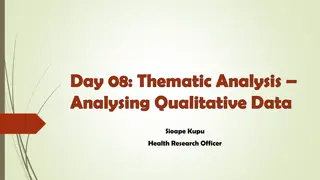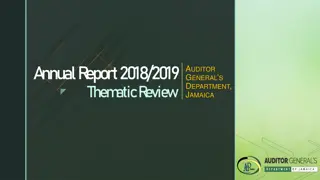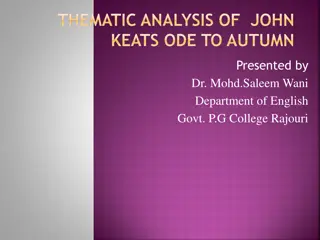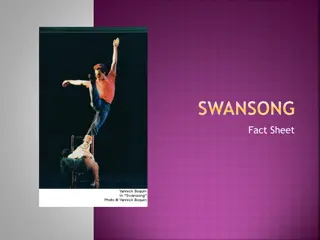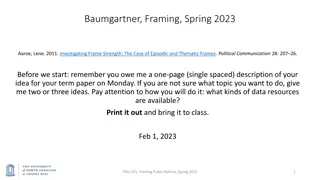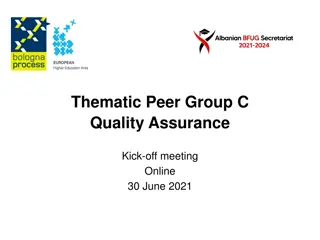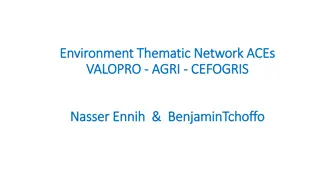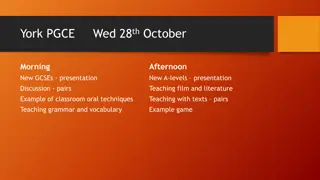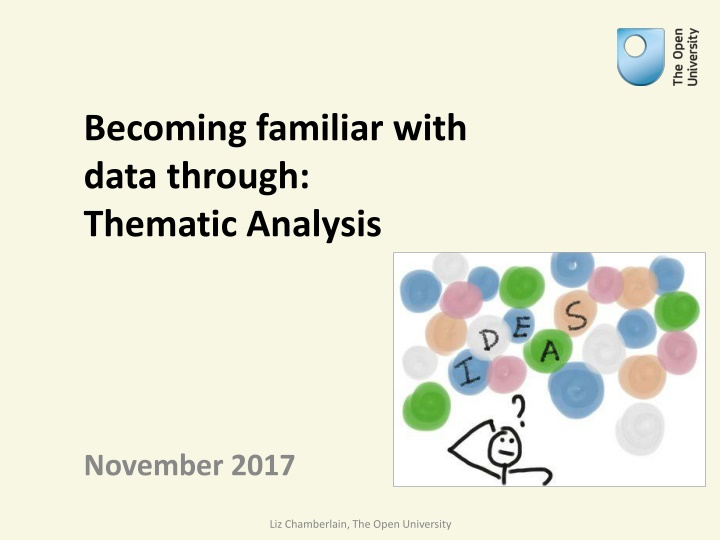
Understanding Thematic Analysis: A Comprehensive Guide
Explore the inductive and flexible nature of thematic analysis, its stages, criticisms, and differences with grounded theory. Learn from the six-phase process by Liz Chamberlain and Braun & Clarke to conduct rigorous data analysis effectively.
Download Presentation

Please find below an Image/Link to download the presentation.
The content on the website is provided AS IS for your information and personal use only. It may not be sold, licensed, or shared on other websites without obtaining consent from the author. If you encounter any issues during the download, it is possible that the publisher has removed the file from their server.
You are allowed to download the files provided on this website for personal or commercial use, subject to the condition that they are used lawfully. All files are the property of their respective owners.
The content on the website is provided AS IS for your information and personal use only. It may not be sold, licensed, or shared on other websites without obtaining consent from the author.
E N D
Presentation Transcript
Becoming familiar with data through: Thematic Analysis November 2017 Liz Chamberlain, The Open University
Aims To learn about the five [six] phases of thematic analysis To understand the importance of being familiar with your data To consider when thematic analysis is the appropriate approach To ask the question, Grounded theory or Thematic Analysis? To reflect on the necessary rigour required for all data analysis Liz Chamberlain
Criticisms It is not part of a branded approach, e.g., grounded theory Therefore, no agreement over its rules and some consider it to be no more than a lite form of grounded theory. Braun and Clarke, 2006 It can be accused of bias, as the researcher decides on the points of interest, the codes and the themes. However, all research can be accused of bias, as it is guided by the researcher. Hennick et al, 2011 Liz Chamberlain
Thematic analysis: is inductive; is flexible; can be incorporated into any epistemological approach. Deliberate decision to wait until all data is collected to allow for structures of signification (Geertz, 1973:9). Goes beyond merely describing implicit ideas (Guest et al, 2012). Need to demonstrate rigour, hence a five phase process (Braun & Clarke, 2006). Liz Chamberlain
So, why isnt it grounded theory? Methodology rather than a method theoretical flexibility Analytical process is Recursive moving back and forth through the steps, rather than in linear process. Messy uses 6 phases to keep the focus Inductivedoesn t try to fit pre-existing coding Deductive analyst decision Semantic and latent themes Connected knowing (Belenky et al, 1986) Multiple definitions of Grounded Theory Full and lite No attempt to develop a theory in thematic analysis Liz Chamberlain
Braun & Clarke: Six phase process Phase One Familiarisation with data Phase Two Generating initial codes Phase Three Searching for themes Phase Four Reviewing themes Phase Five Defining and naming themes Phase Six Writing the report Braun & Clarke (2006)
In conclusion Allow the data to show what is there and expect the possibility of being surprised. Return to theories and literature to contextualise and understand what the data is saying. Be prepared for the data to challenge, disrupt, advance, present new views. Avoid putting the theoretical cart before the empirical horse. Liz Chamberlain
Bibliography Belenky, M., Clinchy, B., Goldberger, N. and Tarule, J, (1986) Women's Ways of Knowing, NY, Basic Books. Braun, V. and Clarke, V. (2006) Using thematic analysis in psychology, Qualitative Research in Psychology, 3, (2). pp. 77-101 Geertz, C. (1973) The Interpretation of Cultures: Selected Essays, NY, US, Basic Books. Guest, G., MacQueen, K. and Namey, E. E. (2012) Applied Thematic Analysis, London, Sage. Hennick, M., Hutter, I. and Bailey, A. (2011) Qualitative Research Methods, London, Sage. Liz Chamberlain
Useful videos https://www.youtube.com/watch?v=SDiWce6 Cbsw https://www.youtube.com/watch?v=8RyaAKsj a2U https://www.youtube.com/watch?v=5qcLLcuE zec - The Simpsons: A perfect balance Liz Chamberlain


